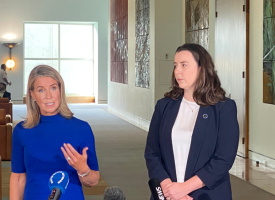Government Must Heed Latest IPCC Report Warnings On Climate Change and Human Health
AMA President, Dr Tony Bartone, said today that the Government cannot ignore the worrying predictions for human health detailed in the latest report from the Intergovernmental Panel on Climate Change (IPCC).
The report – Global Warming of 1.5°C, an IPCC special report on the impacts of global warming of 1.5°C above pre-industrial levels and related global greenhouse gas emission pathways, in the context of strengthening the global response to the threat of climate change, sustainable development, and efforts to eradicate poverty – highlights the scientifically-based threats to human health that could occur if governments do not act to tackle climate change.
According to the report, limiting global warming to 1.5°C would require rapid, far-reaching changes in all aspects of society.
The IPCC says that limiting global warming to 1.5°C compared to 2°C could go hand in hand with ensuring a more sustainable and equitable society.
Dr Bartone said the report reiterates the scientific reality that climate change affects health and wellbeing by increasing the environment and situations in which infectious diseases can be transmitted, and through more extreme weather events, particularly heatwaves.
“This is consistent with AMA policy,” Dr Bartone said.
“The IPCC has previously concluded that there is high to very high confidence that climate change will lead to greater risks of injuries, disease, and death due to more intense heatwaves and fires; increased risks of undernutrition; and consequences of reduced labour productivity in vulnerable populations.
“The 2018 report shows that the magnitude of projected heat-related morbidity and mortality would be even greater with global warming at 2°C than by limiting global warming at 1.5°C.
“The impact on human life is significant.
“The AMA urges the Government to seriously consider these predictions, and act accordingly,” Dr Bartone said.
According to the Appendix of the 2018 IPCC Report:
- Years of life lost due to heat-related illness in Brisbane are projected to increase from 616 in 2000, to 1178 at 1.5°C, and then to 2845 at 2°C.
- In Australia’s five largest cities, with estimated population change, heat-related deaths are projected to increase from a baseline of 214 per year, to 475 per year at 1.5°C, and to 970 per year at 2°C.
Other impacts at 1.5°C compared to 2°C include:
- A higher increase in ozone-related mortality.
- A higher risk of malaria due to an expanded geographic range and season of the anopheles mosquito.
- A higher risk of dengue, yellow fever, and Zika virus due to an increased number and range of the aedes mosquito.
- A more significant increase in vector-borne disease transmission in North America and Europe, including West Nile Virus and tick-borne diseases.
The IPCC report cites 6,000 scientific references, includes the contribution of thousands of expert and government reviewers worldwide, and was prepared by 91 authors and review editors from 40 countries.
The AMA Position Statement on Climate Change and Human Health is at https://ama.com.au/position-statement/ama-position-statement-climate-change-and-human-health-2004-revised-2015
10 October 2018
CONTACT: John Flannery 02 6270 5477 / 0419 494 761



